Being the text of speech delivered by Hajia Saidat Otiti, in Lagos on December 7, 2014 at the 4th Muslim Public Affairs Centre (MPAC) National Convention.
LET US BE MUSLIMS
The worldview underlying the character and behaviour of the Muslim is the Islamic world view which derives its value premises from the Quran and the Sunnah.
Islam believes in unbounded universality. The Quran addresses Allah as ‘Lord of the Universe’. It hails the Prophet ‘as blessing to the world’. The Quran commands ‘Read’ this reveals that Islam is the culture of knowledge. The Quran stresses tolerance. The Quran praises a magnanimous outlook – this implies that Islam expects a sublime disposition toward others, which overlooks and ignores their faults.
Islam seeks to inculcate God consciousness in the people, which diverts their attention from this world to the hereafter, which fills the people’s hearts with love for mankind, which generates the feeling of being well-disposed towards all without any discrimination and which in its fold, teaches one to become more particular about his duties than his rights.
For a typical Muslim today there appears to be a lag between the life as enjoined on him by the Quran and the life he has devised for himself. There is a lag between the Social and political institutions which the Quran desires him to install and the institutions which he has set up for himself and developed in the course of history. There is a lag between the Universality of the Quran and the isolationist religiosity of the present day Muslim.
An incident was recorded in the life of Caliph Umar. The Caliph was travelling from Madinah to Makkah. On the way one early morning, he noticed a flock of sheep at the base of a hillock. A boy was tending the flock. To test whether the teachings of the Quran had, at least in their elementary form, ever reached this boy living in a remote corner of Arabia and to what extent he had reacted to them in his individual life, he asked him if he would like to sell one of the lambs in the flock. Promptly a definite “No” was the answer. “But why?” asked the Caliph. “Why? – Because it is not mine”, rejoined the boy. “ It is my master’s, and I am his slave”, “What does it matter?” said the Caliph. “Take this money, give that Lamb to me; and go and tell your master that some wolf snatched away his lamb”. The boy stared hard at the Caliph, incredulously !. The poor fellow did not know whom he was staring at. “I can cheat my master over there on the other side of the hillock. But can I, “He stressed, “ cheat that Great Master who is overlooking both of us and listening?” The boy was an illiterate boy. He had never read the Quran but the atmospheric influence of its teachings had evidently touched his mind. He must have heard in some manner the Quranic words that God “knows what dark suggestions his soul makes to him” and that He is nearer to him than his jugular vein” (Qaf 50:16), and that ‘they can hide their sin from men but they cannot hide it from Allah..” 4:108 and that “there is no secret consultation between three, but he makes the fourth among them, nor between five but He makes the sixth, – nor between fewer or more, but He is in their midst wheresoever they be” (al-mujadilah, 58:7). He must also have heard that none can give away or sell anything which does not belong to him. What profound impression the reply of this boy must have created on the mind of a man like Umar, that austere and mighty Caliph of Islam, can easily be imagined. “ Tears rolled down his cheeks “ says the narrative. Tenderly, he asked the boy to lead him onto his worldly master, the owner of the flock. On meeting him the Caliph enquired: “How much did you pay for this slave?” “So much”, replied the owner. “Here is that much, take it, and set the boy free”.
Of course the boy became free and Umar went his way. But the question will as well be asked: How many of us whether Muslim or non-Muslim, in all stations and walks of life, how many brilliant products of our Universities, how many of those who conduct today the affairs of their countries, indeed how many of those who have subscribed to the Charter of the United Nations and the Universal Declaration of Human Rights have attained that stage of mind or attitude which this boy of 1,400 years back had reached or have felt the same sense of God and held themselves responsible to Him in all that they have thought or done in their several lives?
It is this sense of God which the Quran aims to inspire in man , and base thereon an order of society every member of which shall be a “keeper or shepherd unto every other”. – a brotherhood co-extensive in its final reaches with the whole of mankind who, in the words of the Prophet of Islam, constitute the “Family of God”.
Islam is a way of life which provides the worldview which influences the whole human personality – behaviour, life-style, tastes and preferences and attitude towards other human beings, resources and the environment. The Islamic worldview, values and institutions impact on individuals and society alike. It gives primary importance to Moral Values, Human brotherhood and Socio-economic justice . It relies on the integrated roles of Values and institutions, market, families and the state to ensure the realization of this Vision, ensuring the well-being of all.
More importantly, the role of the individual is crucial.
Islam is an untarnishable source of Values, the practice of which builds in an ideal Muslim, internalized moral values that direct persons to seek their self-interests in ‘fair’ ways. Individual aggrandizement is inhibited by deeply ingrained moral sense based on the Islamic worldview.
Let us put the topic in context by asking what is the purpose of life?
What is the purpose of life?
If you do not figure out the purpose of life, tendency is to sail off without a rudder and get buffeted in the very rough seas of life. If you are not guided by a clear sense of purpose you are likely to fritter away your time and energy on obtaining the most tangible, short-term signs of achievement not what is really important.
Allah says in the Quran “I have not created the Jinn and mankind except to worship Me”. Q51:56
In Arabic worship is called ‘Ibadah’ – it connotes the obedient submission to the will of God. This was the essence of the message of all the prophets sent by God to humankind. The ‘Will of God’ is contained in the divinely revealed laws which the prophets taught their followers. Consequently, obedience to divine law is the foundation of worship.
All of the various acts of worship contained in the divine laws are designed to help humans have God-Consciousness.
God-Consciousness
The Islamic ethics and moral value is anchored on the basis of the individual developing God-Consciousness. These run through the five pillars of Islam: – To testify that there is no God but Allah and Muhammad is His Messenger. 2. Establishing Prayer. “ Verily , prayer prevents one from shameful and evil deeds.” Q29:45. Regular prayer is ordained at fixed times of the day to organize the day of the Muslim around the remembrance of God. It interweaves spiritual needs with material needs on a daily basis. ..3. Zakat… Stimulates personality growth and improves ties of mutual love 4. Fasting during the month of Ramadan…” Fasting is decreed upon you as it was decreed upon those before you so that you can develop God-Consciousness”. Q 2: 183 and Hajj…. ‘Righteousness is the best preparation for this’. Q2:197.
Articles of Faith
In the same vein, the articles of faith : Believe in Allah, in His Angels, in His Books, in His prophets, in the Day of Judgment and in Divine Decree, enjoins the Muslim to believe in the existence of that which is beyond the reach of perception and portents the transient nature of this world and that there is accountability and eternal life hereafter.
Let us look at a few of some of the virtues we need to inculcate as Muslims.
Live for a higher purpose – live at a higher level
Sincerity and purity of intention
The Muslim is aware that his sincerity and purity of intention are his most important assets for without them his apparently most virtuous deeds will bring nothing but disaster.
From the Islamic perspective, our actions can fall in one of three categories and our intentions have different implications for each of them.
In the first category are the religiously mandatory acts or the voluntary acts of worship, the second category consists of the prohibited acts and in the third category are the permissible acts that include most of the mundane activities in life, like eating, drinking, sleeping, earning a living, and raising a family.
With regards to this category (permissible mundane acts) our intentions have a potential for turning them into acts of worship. This is also an aspect we ignore to our own loss. For here is the possibility of turning every moment of our life into an act of worship through a change in our intentions. For example, when a believer goes to his place of work with the intention of fulfilling his religious responsibility to provide for his family and earn halal living, he may be engaged in the same physical activity as the next person but his outlook is very different. And so is his reward! Through this small effort we could really be living for a higher purpose and at a higher level.
Career advancement, Financial success, Fame and other worldly goals are always secondary and should not contradict our worship. Ideally, these goals should be the means to achieve the primary objective of worshipping only Allah.
Tolerance; Patience
In this world, man has to lead his life in circumstances in which he experiences various kinds of situations: there are times of gain, times of loss; times of happiness and times of grief. Sometimes he receives good treatment at the hands of others, at other times his fate is quite otherwise.
The ideal Muslim is one who undergoes all these experiences without losing his integrity. Under no circumstances is his inner peace disturbed. However untoward the occasion, he can maintain his natural balance. Success does not make him proud. Power does not make him haughty. No bad treatment of others drives him to seek vengeance in anger.
The Prophet of Islam was in the Masjid al-Nabi in madinah, the 2nd most sacred mosque in Islam, when a bedouin, that is a desert arab entered the mosque and urinated inside it. It was obviously a very provocative matter. But the Prophet was not at all provoked. After the nomad had urinated, the Prophet simply asked his companions to bring a bucket of water and wash the place clean.
We are enjoined to show respect to all human beings irrespective of their Creed.
One day the Prophet was sitting with his companions in Madinah when a funeral procession passed by. The Prophet stood up. His Companions pointed out that it was the funeral of a Jew, that is, a non-Muslim. The Prophet replied. ‘Was he not a human being?. This incident shows that the Prophet was looking at the matter by separating two different aspects of the Jew, that is, his being a non-Muslim, and his being a human being. At that moment he overlooked his non-Muslim identity and saw him simply as a human being.
Peace
Islam aims to build a peaceful society at all cost. One of the teachings of Islam is ‘reconciliation is the best’ (4:128). In this regard Islam enjoins us to establish peace even at the cost of unilateral sacrifice and patience. An event of the 1st phase of islamic history provides us with an example of this unilateralism. This is known as the Hudaybiya Treaty. This was in actual fact a no-war pact which was secured by accepting all the demands of the rival group. To bring about an atmosphere of peace within the society, Islam has given a number of commandments. For instance, the Prophet of Islam observed ‘A Believer is one from whom people feel secure as regards their lives and property (at-tirmidhi). Another hadith has this to say: By God, he is not a believer from whose nuisance his neighbour is not safe. (A-Bukhari).
Islam aims at making all individuals peace-loving to the ultimate extent. Let us all strive then to establish peace in the world, for that is the bedrock on which all human progress rests.
The Dignity of Labour
“ That one of you takes his rope and then comes with a load of wood upon his back and sells, is better than to beg of men whether they give or reject him”.
“ The best earnings are those of the businessman who does not tell a lie when he speaks; does not mis -appropriate the trust; does not break the word if he promises; does not boast while selling his goods; does not prolong the period of repayment of Loan; and does not cause difficulty to his debtors !” Hadith.
Allocate Your Resources
All resources at the disposal of human beings are a trust and must be used for the well-being of all in conformity with Islamic values. However well-being in islam is not a function of just material possession and unlimited consumption, rather it is a function of the balanced satisfaction of both the material and spiritual needs of human personality.
“ The material things which you are given are but the conveniences of this life and glitter thereof, but that which is with Allah is better and more enduring; will you not then be wise” (Q28:60).
You have got to define for yourself what you stand for and draw the line in a safe place. At times when you realize that the step you are about to take is the wrong step, it will prove to be an important life decision to resist the temptation whose logic is ‘’ In this extenuating circumstance, just this once, its Ok”, because you will find out that life is an unending stream of extenuating circumstances. If you succumb to the temptation to cross the line ones, tendency is to do so over and over subsequently. The marginal cost of doing something wrong ‘just this once’ always seems alluringly low. However, you do not see the end result to which that path leads.
Allah says in the Quran, “Leave sin, open or secret the recompense shall surely come” Q6:120.
Again, a number of times we find ourselves in situations where we need to make a right decision based on our value judgement, a tough one though, and then we succumb to fear … fear of the unknown ?… fear of poverty ? etc . You need to brave up to take that right step.
‘Satan threatens you with poverty and orders you to immorality, whereas Allah promises you His forgiveness and bounty ..“. Q2:268
The Good and the Evil are not equal. Q5:100
There is also the logic of ‘Everybody is doing it, so why not?’ No ! Do not allow the overwhelming nature of evil delude you.
“ Do not let the strutting about of the unbelievers in the land deceive you. This is but a trifling and fleeting enjoyment.” Q3:196-197
The conscious Muslim – He that believes in Allah and the last day, brings to bear the realization that accountability is going to be on an individual basis.
Says the Quran “Each one of them will come before God on the Final Day as an individual”.(19:95).
So in our individual capacity should we not resolve to live Islam and contribute our quota to making the world a better place?
Living Islam
–As a politician, I will seek to get to office through due process and fair means; I will contend only with a view to adding value, providing service and leaving my sphere a much better one than I met it. I will not embezzle or mis-appropriate funds. I will not be corrupt, aid and abet corruption.
–As a Public Officer, I will discharge my duty with focused diligence, I will be fair, I would have integrity, I would be reliable and dependable. It would not matter that there are failed institutions that allow for anomalies and adverse incentives, I would be guided by a higher ideal and a high sense of value that is averse to misbehavior.
–As a Stock-Broker, I will not play the market and compromise my integrity for a ‘small’ gain, I will not indulge in manipulative and hyper-speculative activities.
–I would not amuse myself at the expense of another on the social media by engaging in social media avenues and / or subscribing to blogs involved in glorified slandering, backbiting and defamation of others’ character, that has become the order of the day.
–I will not deliberately indulge in Riba
–I will not directly or indirectly put a human life in jeopardy.
–I will not be involved in cultism or delve into the occult at any point in my life.
– I will strive for excellence in all that I do.
–I will not cheat, I will give full measure. My word will be my honour. I will fulfill my obligations.
–As a student, I will work & pray hard to achieve excellently on merit, I will not compromise myself and dignity otherwise.
–As a person, I will strive to earn an halal living, holding fast to the belief that I am bound to receive what Allah has ordained for me. Threading on the forbidden path is not an option. It will not earn any more than what has been apportioned for me.
–I will strive to make Islam operative in all sphere of my life, as should ideally be the case. My decisions will be informed and filtered through my value judgment which itself is informed by my Islamic world view.
–I will strive to be amongst those that the Quran refers to as ‘those that reflect’, ‘those that think’ , ‘those that are discerning’, ‘those of understanding’, ‘those that are patient’, those that are humble’ , those that are wise…’those that are God-Conscious.’
–I will strive to live Islam. I will be a conscious Muslim.
In the final analysis, a conscious Muslim forms part of the community which Allah refers to in the Quran as “ .. You are the best nation produced for mankind because you command righteousness, forbid evil and believe in Allah…’
Let us make Islam a shaping force in our lives, impacting on all our activities and behaviors.
Let us be Muslims.
Text of speech delivered by Hajia Saidat Otiti, in Lagos on December 6, 2014 at the 4th Muslim Public Affairs Centre (MPAC) National Convention. Hajia Otiti is the CEO, Baytuzzeenah.
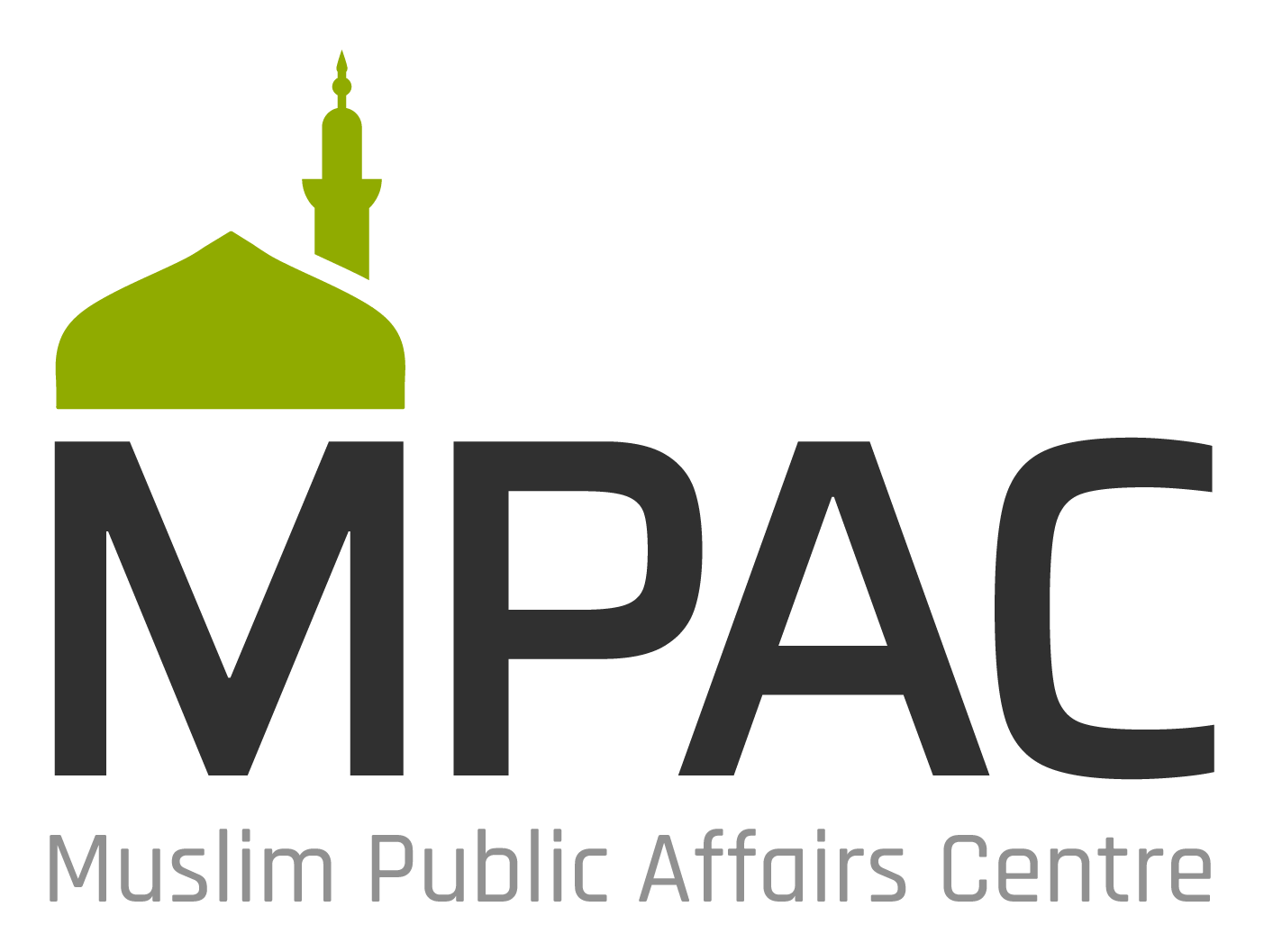

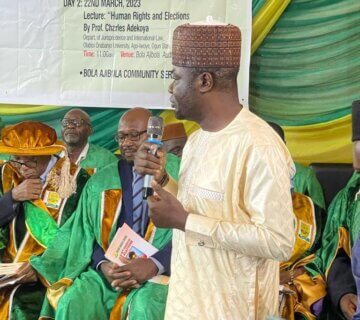
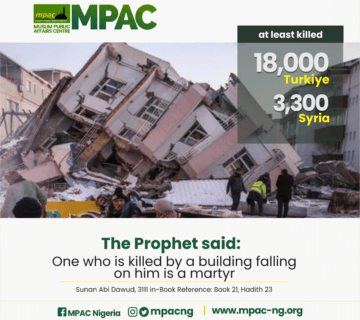
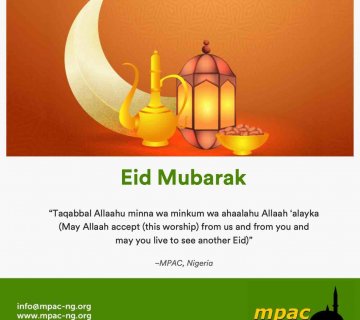
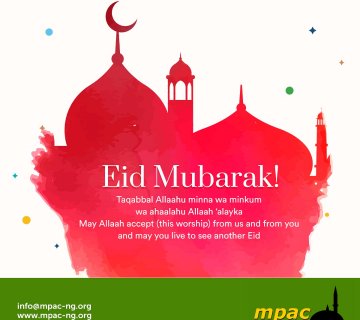
No comment